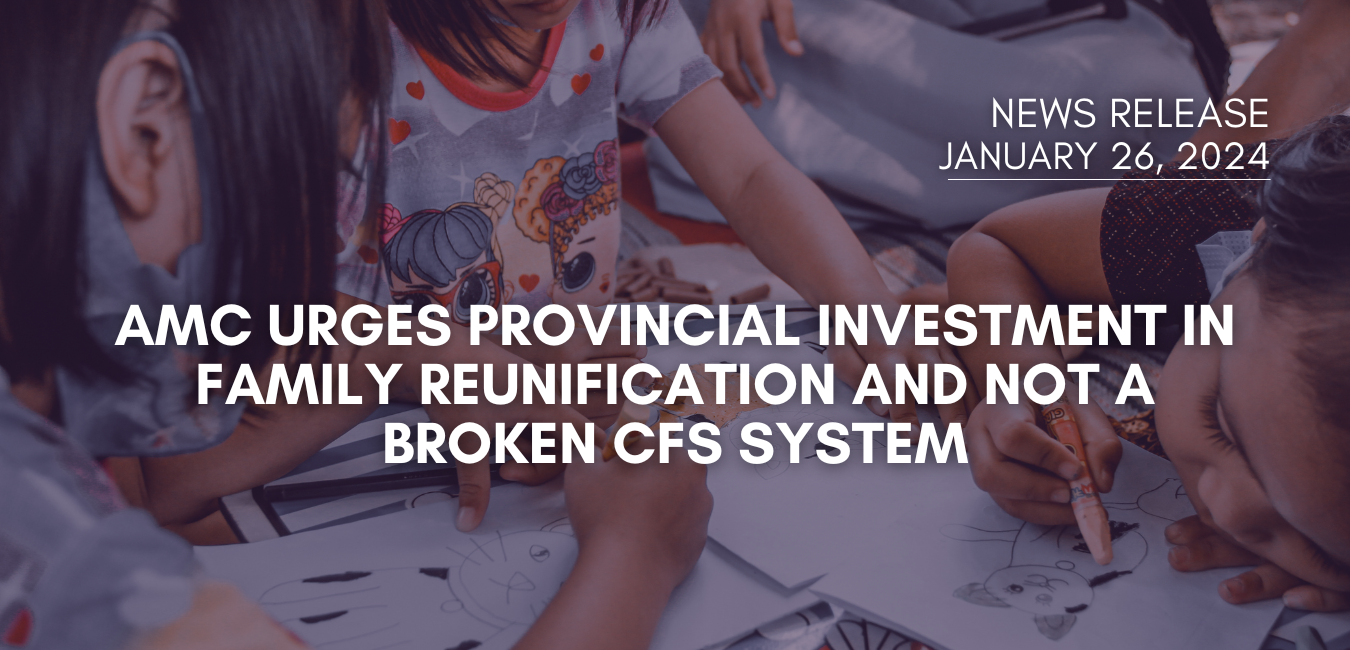AMC Urges Provincial Investment in Family Reunification and not a Broken CFS System

January 26, 2024
Treaty One Territory, Manitoba
AMC Communications
Treaty One Territory, Manitoba – the Assembly of Manitoba Chiefs (AMC) issues this statement in response to the Manitoba Liberal Party calling for the province to increase foster parent maintenance rates and service fees, citing that current rates have not kept pace with rising costs.
During a news conference yesterday, interim Liberal Leader Cindy Lamoureux said supporting foster parents is crucial to better assisting children in the province as resources have become strained over time. As of now, foster parents receive between $8,000 and $10,000 a year in Manitoba. However, raising a child is estimated to cost at least $17,000 a year on average across Canada. The Manitoba Foster Parent Association endorsed this call and cited concern that failure to raise the basic maintenance rate over the last ten years has prevented foster children’s development opportunities.
“We should not be focusing on investing in a broken system that commodifies vulnerable children whose families need as much support as possible to care for their own” states Grand Chief Merrick. “First Nations recognize that there is a time and place for foster placements, but this provincial child welfare system has practiced protection over prevention services for such a long period that it has created an industry of foster care work that does little to respect or preserve the rights and needs of First Nations children, their identities and long-term wellness”.
First Nations children currently represent over 80% of children in care in Manitoba’s child welfare system. Given their chronic overrepresentation and placement in culturally inappropriate homes, the child welfare system continues to contribute to the erosion of First Nations belonging, identity and connection to their Nation. The province cannot continue to invest in a broken system that ultimately leads to some of the worst health and social outcomes for First Nations children and youth, many of whom are aging out directly into homelessness, are not provided appropriate transitional planning into adulthood, and often go without having their basic needs met while in foster care. Furthermore, this request for investing in the foster care system does not align with the federal government reform measures or the restoration of First Nations jurisdiction, focusing on empowering preventive care and family reunification.
Grand Chief Merrick shares, “Increasing foster care rates only addresses one symptom of a greater problem and neglects to address the endemic issue of historical underfunding of infrastructure supports and assistance rates that help truly lift First Nations families out of poverty by both levels of government. We cannot continue investing in a system that profits off vulnerable First Nations children; we need to truly shift towards preventive care, family reunification and post-reunification”, adds Grand Chief Merrick.
Despite legislation that prevents child welfare interventions based on poverty, it remains one of the largest areas for protection-based intervention. Funding at the front end that keeps children home with the right support is desperately needed.
The AMC urges the Province of Manitoba to prioritize investments in family reunification and post-reunification supports, emphasizing the importance of keeping First Nations children connected to their families, and Nations.
-30-
For more information, please contact:
Communications Team
Assembly of Manitoba Chiefs
Email: media@manitobachiefs.com
About the Assembly of Manitoba Chiefs
The AMC was formed in 1988 by the Chiefs in Manitoba to advocate on issues that commonly affect First Nations in Manitoba. AMC is an authorized representative of 62 of the 63 First Nations in Manitoba with a total of more than 171,000 First Nation citizens in the province, accounting for approximately 12 percent of the provincial population. AMC represents a diversity of Anishinaabe (Ojibway), Nehetho / Ininew (Cree), Anishininew (Ojibwe-Cree), Denesuline (Dene) and Dakota Oyate (Dakota) people.